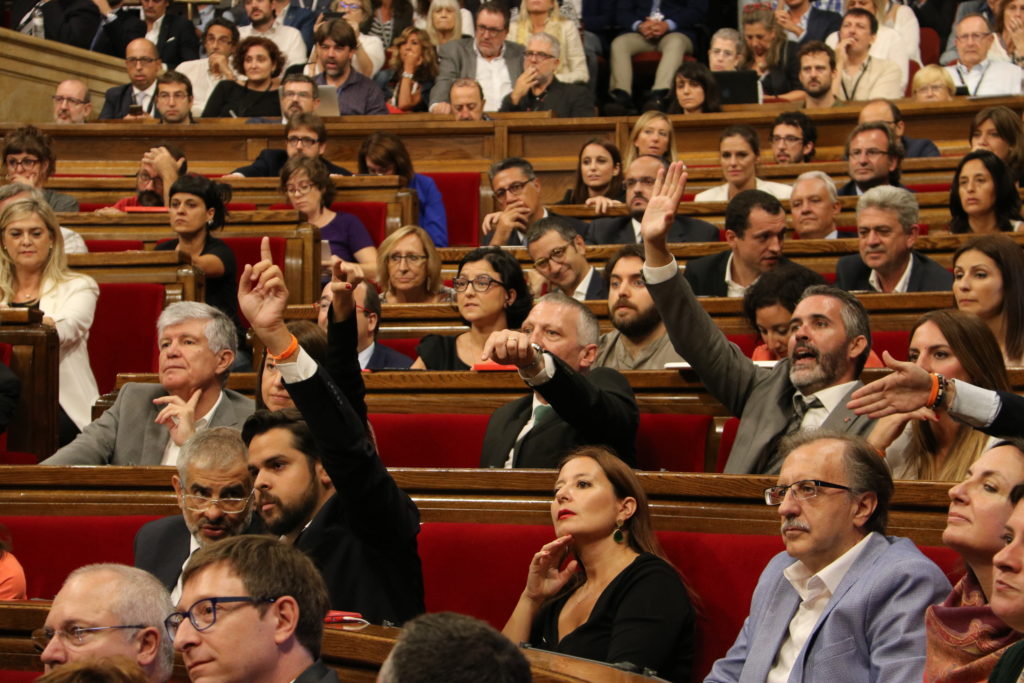06.09.2017 - 15:34
The Catalan Parliament agreed on Wednesday to include the referendum bill on the plenary agenda and vote on it. The decision had 72 votes in favor, 60 against and 3 abstentions. The pro-independence parties, with their overall majority in the chamber, also voted in favor of fast-tracking the legislation, while the rest of groups did not take part in that specific vote. Now the parliamentary groups have two hours to present amendments to the text of the referendum bill, which calls for a self-determination vote on October 1.
Ruling coalition Junts pel Sí asked for the plenary’s agenda to be altered at 10.15am (CET) in order to fast-track passage of the bill and final vote. All the opposition parties took part in a debate immediately afterwards to discuss whether to accept the modification. The far-left pro-independence CUP supported voting on the referendum bill. “We have found no other way to carry out the will of this country,” said CUP spokesperson, Anna Gabriel. “We have found a State, a judiciary system and a majority in the Spanish parliament who think that beyond the indissoluble unity of Spain there is no life, and thus, no rights,” she said.
JxSí spokeswoman, Marta Rovira, also said that they would have preferred to discuss and vote on the referendum bill in another way but that Spain has refused to engage in negotiations. She said that passing the law is the only alternative left for Catalan MPs, who won the 27-S election in 2015 on a pro-independence platform.
Opposition parties oppose referendum bill discussion and vote
The other groups’ representatives rejected fast-track passage of the bill. The main opposition party, Ciudadanos, ironically compared Wednesday’s plenary session with the Catalan National Theater. “This Parliament can discuss anything, but within the law and democracy,” said spokesperson, Carlos Carrizosa.
The Socialists also rejected the proposal. “In democracy, in order for a law to be legal, it has to follow all the proceedings,” said Ferran Pedret. The Catalan branch of the Spanish ruling People’s Party expressed the same view. “It does not fulfill the minimum requirements to be discussed in this plenary,” said lawmaker Santi Rodríguez.
The far-left coalition Catalunya Sí que es Pot (CSQP), including the Catalan branch of Podemos, do not share a unanimous opinion on the issue. Its spokesperson, Joan Coscubiela, said that “the fact of being a majority [in the chamber] does not allow you to violate the rights of the minority”. Some of the CSQP MPs, however, did not applaud his speech. The MP from Podemos Albano Dante Fachín regretted having to discuss procedure issues instead of the political problem in Catalonia, and accused the People’s Party government in Madrid of being responsable for the current deadlock.
The session is now in recess to allow groups to present amendments to the referendum bill
Tension running high
Feelings are running high: the Catalan Parliament president, Carme Forcadell, announced that she is recusing Constitutional Court magistrates “for their lack of impartiality and to guarantee her right to defense.” She is being prosecuted for allowing a debate on the roadmap towards independence last year and she is likely to face more charges from the Spanish judiciary after today’s session for allowing the referendum law to be put to a vote in the chamber.



